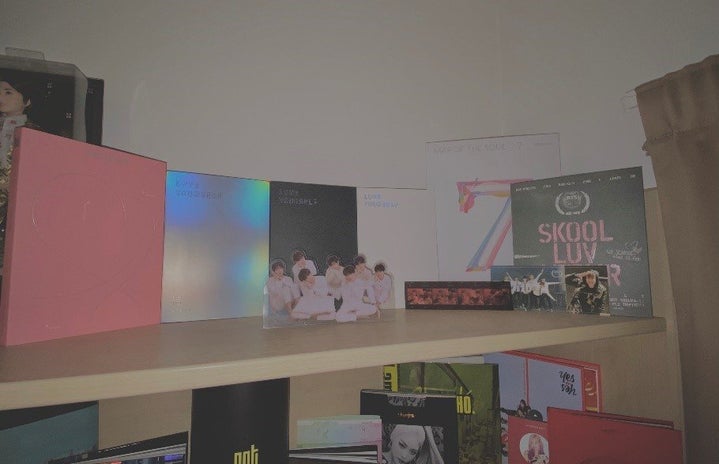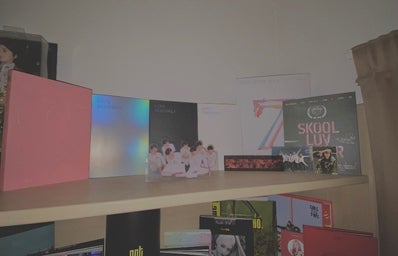BTS have been taking the world by storm over the past few years, with their concerts selling out and their albums breaking historical worldwide records that had been set by them already. And, with the release of their newest album, Map of The Soul: 7, it is clear to see where the astronomical success comes from.
In Interlude: Shadow, rapper Suga (Min Yoongi) examines his experiences of fame. The haunting rhythms and music elevate Suga’s rap style to new heights, giving us an incredibly intimate look into the rapper’s views of his success.
‘Oh that would be my first death/ I been always so afraid of’
The haunting vibes continue in Black Swan, pairing beautiful lyrics and elegant harmonies to form commentary on the group’s fears that, one day, their music will mean nothing to them. It is clear then, that this album is a culmination of BTS’ past and present, their journey from there to here, full of both scrutiny and success.
The atmosphere quickly changes upon the guitar opening of Jimin’s solo song Filter. The song represents Jimin so effortlessly with his unique vocals that stand out against the sultry, Latin influenced rhythms. The song’s concept was developed by Jimin himself about how he ‘[presents himself] to the world in many different ways.’
‘I want to hug the many thorns in the rose that used to sprout’
The album continues with more solo songs, including My Time by member Jungkook who explores his emotions and feelings from his trainee years up until now. The electric beats and powerful vocals by Jungkook establish him as a strong vocalist. It also makes it clear that the group have vivid grasps on not only their collective style, but their individual styles too. Inner Child, a solo by member V (Kim Taehyung), uses his deep vocals to uplift the listener as he talks about accepting the person he both is and was. ‘The me of today is okay’, he sings, a stark contrast to the troubles he speaks of in Stigma, another solo from their album Wings.

‘Would it be okay if I open my eyes and contain you in them?’
In Moon, Jin sings of their fans. It is undeniable that his vocals are beautifully strong as he compares himself to the moon, proudly watching the fans (ARMY), referring to them as the stars. There is something so intimate about the band and ARMY’s relationship, a concept also seen in We Are Bulletproof: The Eternal. A song that shocked fans with its slow and gentle rhythms, The Eternal speaks of the pain that BTS felt in contrast to the healing happiness of the support they receive from fans.
‘Louder than bombs, I sing’
To BTS, this album is not only a collection of their own experiences, but an empowering message to others going through the same. Louder Than Bombs is an attractive collection of vocals and lyrics that encourage fighting against pain. Its deep bass contrasts with the bittersweet lyrics that feel intense and moving as if made to live on a movie soundtrack.
‘Can’t hold me down ‘cuz you know I’m a fighter’
BTS’ title track, ON, is the ultimate culmination of the group’s growth as artists. The track’s name takes inspiration from an earlier track of BTS’, reversing the letters of their song N.O. The powerful chants paired with the drumbeats of UCLA’s Marching Band make this an overwhelmingly empowering song that encourages the listener to accept and cherish the pain and differences we have. The bridge, sung by Jungkook, builds up the tension well until it explodes with passion and pride.

‘In this place, everyone becomes someone with perfect ethics’
In UGH!, BTS’ rap line use a gritty beat to criticise a society obsessed with using empty rage to hurt others. Suga, RM and J-hope are clearly talented and have continuously established themselves as masters of the art because despite its difference to many of the songs in the album, UGH! still manages to cleanly merge with the concept and demonstrates exactly how diverse BTS’ style is. Respect presents us with a song performed by Suga and RM. It plays out to us like a conversation as we listen to the pair question what ‘respect’ means. It is funny and ironic, saturated with sarcasm and humour that is characteristic of both men.
‘One day when this cheer dies down, stay’
Another duet comes in the form of Jimin and V’s Friends, a song that explores the relationship both members have with each other. Yet another personal song, Friends feels incredibly intimate as Jimin and V ask their proclaimed ‘soulmate’ to stay with each other forever. The men of BTS are not afraid to be intimate with both their fans and themselves, making the vocals of Jimin and V even more powerful in partnership with the bouncing, bright rhythm of the song.
‘When the Second and minute hand overlap, the world, for a very brief moment, holds its breath.’
But arguably, the most powerful song from the album is 00:00 (Zero O’clock). A song by BTS’ vocal line, it uses its lo-fi beats to comfort the listener with the group’s vocals. And the translated lyrics are some of the most inspiring on the album. There is something so overwhelmingly emotional and bittersweet about this song that swells in your heart in the most cathartic way. And EGO is the perfect end to such an album. J-Hope’s solo speaks of learning to trust oneself, both past and present, using an upbeat vibe to bring an album full of similar ideas to a powerfully positive end that contrasts Suga’s Shadow.

‘Still reassured and made me know myself’
BTS’ Map of The Soul: 7 is an overwhelmingly intimate journey through exploring and accepting one’s identity, looking back on the group’s individual and collective pasts in the hope that a listener will find inspiration in the lyrics. It is clear that BTS have changed. But, they take pride in that change and the healing that comes with it.
Rating: 9/10
Most notable songs: 00:00 (Zero O’Clock), UGH!, Friends, Louder Than Bombs



